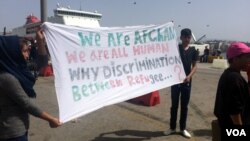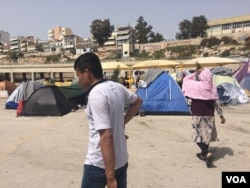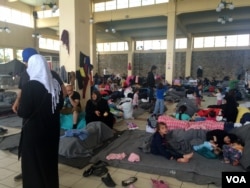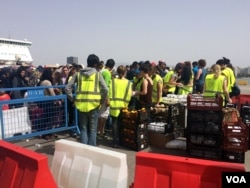When Reem and Mariam’s husbands left Syria last year, the trip to Europe was dangerous, but relatively swift.
The plan was for the men to risk the harrowing sea journey, and then register as refugees in Germany, eventually bringing their families to Europe on safe boats or on planes.
After months of delays involving paperwork, ever changing rules and closed borders, the two women set out with Mariam’s father. Her mother and two younger brothers were left behind, further splintering their family.
“There wasn’t enough money to take everyone,” 17-year-old Mariam explains, taking her head out of a blue plastic tent to talk to us on the pavement in Athens’ main port, where thousands of people have been camping for more than a month.
Greece now faces uncertainty with more than 50,000 refugees and other migrants trapped on its northern border with Macedonia and crowded into camps, detention centers and makeshift settlements. The European Union promises to shoulder much of the burden of this crisis while people who do not apply for asylum have yet to appear, and travelers say ever-evolving refugee policies are tearing their families apart.
People camped here say they must go to Europe to join their children, brothers, sisters or spouses now, as hopes dim for a future for new refugees in Europe. “Are you still hopeful?” I ask the family, wondering why after Europe’s sharp turn away from pro-asylum policies, so many people think there is a chance.
“Very much so,” said Mohammad, the father, grinning. “The girls are going to Germany. Maybe I won’t make it and I’ll go back to Turkey, but wives need to be with their husbands.”
Others in this port are increasingly frustrated, but still not ready to give up.
“I sold my home, my gold and everything else to come here,” shouts another man named Mohammad, a Syrian silversmith by trade who sent his wife and son to Germany after Islamic State militants took over his city. When he gathered enough money, he followed. Now, however, he is stuck, like so many other people in Greece for a month
“And now look at this situation,” he adds, pointing to crowds of women and children on gray utility blankets in a musty port station. “It’s shameful.”
Clearing camp
Greek officials have said several times they plan to close down the settlements in the ports, and the people will be obligated to move to official camps that may or may not be de-facto detention centers.
On Thursday, authorities said refugees and migrants have two weeks to evacuate the port for official camps.
In the port settlement, refugees almost uniformly say they don’t plan to go. “I will sleep in the streets or in the gardens,” says Mohammad, the silversmith.
One problem officials are having is convincing people to move into camps voluntarily because people do not believe promises that the conditions are humane.
“The camp promised us that we would be transferred to a camp …which has sanitary facilities like bathrooms, showers and so on,” reads an open letter from residents of one camp to local officials and U.N. representatives. “But unfortunately, they lied to us. That’s why refugees don’t believe responsibles and top brass of Greece government.”
Other families in Athens already tried staying at camps, but found animals surrounding the remote facilities were endangering their children. “There were foxes and snakes,” says Akram, a former driving school owner from Syria with one son. “It was dangerous.”
The prospect of being forcibly removed rattles few residents here, who say they believe the Greek police will behave humanely. Besides, they say, the port area is vast and mostly empty despite the thousands of people camped out. All they have to do to move, is pick up their tent and walk.
And despite evidence of Europe’s determination to slow down the influx of travelers at all costs, Mohammad says he won’t be deterred. “I don’t want food or anything else. I just want to travel.”
Humanitarian disaster looms
As the winter turns to spring, health conditions in Athens’ port city are relatively good, considering the people have limited food and medicine, according to one doctor, also a refugee, who doesn’t want to be named because he left his family in Islamic State-controlled Syria.
Summer, however, is approaching, he says, and it would be hard to imagine sicknesses not spreading among camp residents, as they are in Idomeni, a makeshift camp on Greece's northern border, where tens of thousands of people are waiting, hoping Macedonia will let them pass.
“The conditions are convenient for these illnesses,” the doctor tells me, appearing lost in despair. He left his family because his home was in an area that supports the Syrian opposition, and his job was in a place controlled by the government. Both sides threatened to kill him.
“Look at my face and you will see.Look at their faces,” he says, pointing to the women and children milling outside the medical trailer. “There is no hope.”
Refugees on the Greek island of Lesbos, where thousands are detained, also fear deteriorating heath conditions after aid organizations quit the main camp in protest of inhumane conditions.
Last week, two young men showed me injuries through a barbed wire fence, while nervous police officers carefully observed. One man’s shin appeared crooked. The other had a foot that was swollen and purple. They pushed their medicines through the fence. They were ordinary over-the-counter painkillers.
“Just these pills,” says Mustafa, who wants to join his brother and sister in Germany.
Less than 10 kilometers from the center on Friday, a second group of people was deported over the objections of human rights organizations that questioned the legality, as well as the morality, of the move.
And as refugees wait, fearing deportation or lock up, some humanitarian workers say the situation will only worsen. On Thursday in Izmir, Turkey, a former smuggling hub, we met Yildirim Sahin, the co-president of the Society of Bridging People. As some people are sent to Turkey, he says, smugglers are devising new ways to get others to Europe.
“The people will still go to Greece,” he explains. “They will find more dangerous ways and more people will die.”








